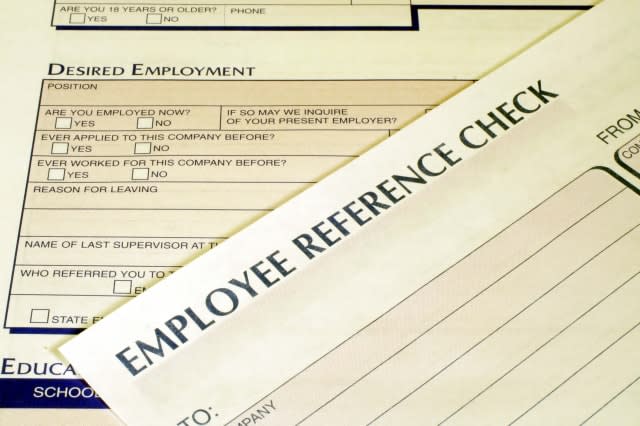What are your rights when it comes to a job reference?

Earlier this month, as a prank, an Australian radio host phoned up a complete stranger and claimed that he needed a last-minute reference for a job at an accountancy firm.
The unwitting victim, James Lord, promised to 'tell them that you're a ripper bloke'.
And when a few minutes later James got a call from 'Graham Burn from Kells & Co', he stepped up to the mark, assuring the caller that the applicant spoke two languages and regularly helped his football team out with fundraisers.
It was a glowing reference: and if it had been genuine, it would surely have done the trick.
Indeed, according to the Federation of Small Businesses, most firms still don't check up on job applicants' references - but many do, and 17% of firms have uncovered at least one fake.
There are even agencies that will provide false references, tailored to individual jobs; and they go to extraordinary lengths, even setting up fake company websites and telephone switchboards for when an employer checks up.
Few of us would be prepared to be quite this dishonest. But references can often be a real problem when applying for a job. Who should you give as a referee, and what are your rights?
Do I have to put my references on my CV?
It's not necessary to list your references on your CV, and these days most people don't; a simple statement that references are available on request is perfectly fine. After all, you probably won't want potential employers to get in touch with your current boss too soon.
If you're filling in an application form that asks for referees, though, you'll need to comply. And sometimes it's a good idea to include them: listing referees can demonstrate that you have good contacts, and have impressed them.
Who should I choose as my referees?
Obviously, the best people to ask to give you a reference are previous employers - although only if you're sure they'll give you a good write-up. It's polite to ask people's permission before giving out their name and contact details.
Sometimes, of course, the person has moved on from the company where you worked with them, but with a little detective work you may be able to track them down.
However, references don't necessarily have to come from previous employers - sometimes customers or other individuals within your organisation can be just as appropriate. And if you're young, it may make sense to include a reference from a university tutor or a teacher.
And you may wish to give different referees for different applications, depending on the nature of the new job and who's best positioned to comment on your ability to do it well.
Does my current employer have to give me a reference?
There's no legal requirement for your current boss to give you a reference; and if they do, there are no rules on how long and detailed it has to be. There are certain exceptions, such as in financial services.
Indeed, these days many of not most employers make it a policy to give only the most basic information: your name, how long you worked at the organisation and your job title. However, if they do give you a reference, the law says it has to be fair and accurate.
Can my employer give me a bad reference?
Your boss certainly can give you a bad reference - although in practice, few do. The reason is that because a reference has to be fair and truthful, they tend to want to play it safe and not say anything that you could possibly use as grounds to sue.
What can I do if I'm given a bad reference?
If you discover that you've been given a bad reference, you can take legal action - although only if, as we've seen, the reference is either unfair or inaccurate.
You'll need to be able to prove that the information in the reference was misleading; that it's had a negative effect on your employment prospects; and that your employer was negligent in providing it.
Do I have a right to see my reference?
Employees are permitted to see or request a copy of employer references under the rules of the Data Protection Act. However, you can only request your reference from the organisation it's been given to, rather than from the person giving the reference, and you'll have to pay a £10 fee.




